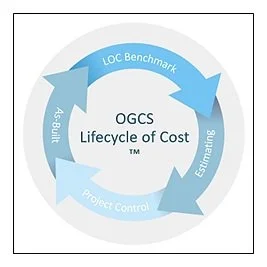Is America’s Oil and Gas Industry Missing Out by Not Using Quantity Surveyors?
The global oil and gas industry is one of the most capital-intensive sectors in the world, requiring meticulous cost management, risk mitigation, and financial oversight to ensure project success.
In regions like the United Kingdom and Europe, the role of the Quantity Surveyor (QS) has long been recognized as an essential function for cost control and certainty. In the United States, the profession of Quantity Surveying remains underutilized.
In this piece, Richard Smith, SVP Commercial Management for OGCS Americas, gives his view on how American industry is missing out, and what could be gained by embracing best practice from other regions.
“Quantity Surveyors are much more than cost estimators” explains Richard, “I like to think of them as the ‘commercial conscience of the Project Manager’. When utilized fully, quantity surveyors provide financial and contractual expertise that supports every aspect of a project’s economics.”
“From initial feasibility studies to post-construction audits, QS professionals ensure that projects are delivered on time, within budget, and to the highest standards. In oil and gas, where projects often involve billions of dollars and complex supply chains, the role of a QS becomes even more critical.”
Industry studies indicate nearly 80% of mega-projects in the sector exceed their initial budgets, often by significant margins. Quantity Surveyors specialize in accurate cost forecasting, value engineering, and budget management. By conducting detailed feasibility studies and risk assessments early in the project lifecycle, experienced QS professionals can identify potential cost pitfalls and implement strategies to mitigate them.
In the U.S., cost estimation is often handled by engineers or project managers, who may lack the specialized training in financial management that QS professionals possess. This can lead to overly optimistic budgets and unexpected cost escalations. By adopting the QS model, organizations could achieve greater budget accuracy and reduce the financial risks associated with large-scale oil and gas projects.
The oil and gas industry operates in a high-risk environment, with factors such as fluctuating commodity prices, regulatory changes, and geopolitical instability adding layers of complexity. Richard notes that QS professionals are trained to identify, quantify, and manage these risks. They work closely with project teams to develop contingency plans and ensure that contracts are structured to protect the client’s interests.
Risk management is often fragmented in the U.S., with different professionals handling discrete aspects of a project. This siloed approach can lead to gaps in oversight and increased exposure to financial and operational risks.
“By integrating Quantity Surveyors into their teams, coupled with the implementation of OGCS systems such as boqsor*, organizations can truly benefit from a more holistic approach to risk management, ensuring that all potential threats are identified and cost certainty addressed proactively.”
Richard Smith, SVP Commercial Management
“Expert QS support adds real value in the procurement process,” says Richard. “Procurement is a hugely complex process, involving multiple suppliers, contractors, and subcontractors across global supply chains. Quantity Surveyors excel in procurement strategy, ensuring that materials and services are sourced at the best possible value without compromising quality.”
He continues: “Quantity Surveyors play a key role in contract administration too, helping ensure all parties adhere to their obligations and ensuring that disputes can be tackled efficiently.”
In the U.S., procurement and contract management are often handled by in-house teams or external consultants who may not have the same level of expertise in cost optimization and contractual law as QS professionals. This can lead to inefficiencies, delays, and costly disputes. By leveraging the expertise of Quantity Surveyors, organizations can streamline their procurement processes, reduce costs, and minimize the risk of contractual disputes.
“One of the most significant advantages of Quantity Surveyors is their focus on lifecycle cost management.” Richard explains.
Lifecycle of Cost
“At OGCS we consider the total cost of ownership, including operation, maintenance, and decommissioning. This is particularly important in the oil and gas industry, where the lifecycle of a project can span decades.”
Furthermore, “these lifecycles repeat and to truly improve, you need to learn from both successes and failures. At OGCS we have our own internal process of Life Cycle of Cost which manages this full commercial lifecycle through process, methodology and systems.”
Lifecycle Cost Management is a topic that Richard Smith is passionate about. “By adopting an approach that embraces QS best practice, organizations make informed decisions that optimize costs over the long term, ultimately improving profitability and sustainability.”
The U.S. oil and gas industry is increasingly competing on a global stage, where international best practices in project management and cost control are the norm. In the UK and Europe as well as other commonwealth countries the Quantity Surveying profession is an integral part of major capital projects. By OGCS providing a full range of commercial services and providing a level of financial oversight and risk management that is unmatched. By not utilizing QS professionals, domestic U.S. companies are operating at a competitive disadvantage.
Adopting the QS model would not only bring the U.S. in line with international standards but also enhance its ability to collaborate with global partners. This is particularly important in joint ventures and cross-border projects, where consistent cost management practices are essential for success.
In Conclusion
The U.S. oil and gas industry is a powerhouse of innovation and productivity, but it is missing a critical piece of the puzzle by not embracing the role of Quantity Surveyors. The expertise of QS professionals in cost control, risk management, procurement, and lifecycle cost management could deliver significant benefits, from reducing budget overruns to improving project outcomes.
OGCS Global incorporates international best practice in all our QS processes. U.S. organizations that leverage our trained and experienced Quantity Surveyors, can unlock new levels of financial performance and project success.
Contact Richard Smith today to learn more about our proven track record of delivering results in the energy sector. You’ll discover how OGCS can help your organization achieve its financial and operational goals.


